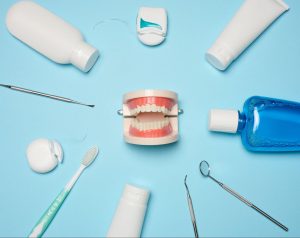A bright, white smile is often associated with beauty, health, and confidence. For many, teeth whitening is a go-to cosmetic treatment to achieve that desired pearly-white smile. But how long does teeth whitening last? The longevity of teeth whitening results depends on several factors, including the type of whitening procedure, personal habits, and lifestyle choices.
Understanding Teeth Whitening
Teeth whitening is a cosmetic dental service that lightens your teeth’ color and helps remove stains and discoloration. There are several different methods of whitening, each with varying levels of effectiveness and longevity.
Types of Teeth Whitening Treatments
Several types of teeth whitening treatments are available, each offering varying degrees of effectiveness and convenience. Understanding the differences between these options can help you choose the best method for achieving and maintaining a bright, white smile.
In-Office Professional Whitening
A dentist or dental professional performs in-office teeth whitening. The procedure typically involves the application of a strong whitening gel, often enhanced with a special light or laser to accelerate the process. This method provides immediate, dramatic results and is the most effective whitening.
Over-the-Counter Whitening Products
Over-the-counter (OTC) whitening products such as strips, toothpaste, gels, and mouth rinses are easily accessible and typically more affordable. These products often contain fewer whitening agents than professional treatments, meaning they may take longer to show results and usually provide less dramatic whitening.
Natural Whitening Methods
Some people use natural methods to whiten teeth, such as brushing with baking soda, activated charcoal, or oil pulling. While these may help to remove surface stains, they are generally not as effective for significant whitening and do not provide long-lasting results.
How Long Does Teeth Whitening Last?
The duration of your teeth whitening results depends on various factors. On average, the results from professional in-office whitening last between six months and two years, depending on personal habits and the method used. Over-the-counter products and natural methods tend to provide shorter-lasting results.
Factors That Affect the Duration of Teeth Whitening
The longevity of teeth whitening results can vary depending on several key factors. Understanding these factors can help you manage expectations and maintain your bright, white smile for as long as possible. Your diet, oral hygiene habits, and lifestyle choices, such as smoking, can all influence how long your whitening results last. Regular dental cleanings and touch-up treatments can also help extend the brightness of your teeth.
Type of Whitening Treatment
As mentioned earlier, the type of whitening procedure you undergo has a significant impact on how long your results last. Due to their higher concentration of whitening agents, in-office treatments provide longer-lasting results than over-the-counter products. Professional take-home kits tend to offer results somewhere in between.
Duration of Whitening Results Based on Treatment Type
In-office treatments can last anywhere from six months to two years, at-home treatments may last from six months to a year, and OTC products typically provide results that last only a few months. Natural methods offer the least lasting effects, often only whitening teeth briefly before stains return.
Diet and Food Choices
What you eat and drink plays a significant role in the longevity of your teeth whitening results. Certain foods and drinks can stain your teeth over time, undoing the effects of whitening. These include:
Foods and Drinks That Can Stain Teeth
Certain foods and drinks are known to stain teeth due to their deep colors or natural pigments. Coffee, tea, and soda contain tannins and acids that can contribute to discoloration. To maintain your white smile, it is essential to minimize your consumption of these staining foods and drinks. If you indulge, try to rinse your mouth with water afterward to reduce the impact on your teeth.
Smoking and Tobacco Use
Nicotine and tar found in tobacco products can cause severe staining on your teeth. Smokers may find that their whitening results fade more quickly than non-smokers. The longer and more frequently you use tobacco, the faster your teeth will return to their previous stained state.
Oral Hygiene Habits
Proper oral hygiene is essential for maintaining your teeth whitening results. Brushing your teeth twice a day, flossing regularly, and using mouthwash can help prevent plaque buildup and surface stains from forming. Regular brushing also helps to remove any food particles that can cause discoloration. If you are diligent about oral hygiene, your whitening results will last longer. On the other hand, if you neglect your dental care, the stains will return more quickly.
Teeth Sensitivity
For some people, whitening treatments can cause temporary sensitivity in their teeth. If this occurs, avoiding brushing or using whitening toothpaste may be tempting. However, skipping these crucial steps can lead to plaque buildup and staining, making your whitening results fade faster. If you experience sensitivity after whitening treatments, it’s important to use gentle, desensitizing toothpaste and continue practicing good oral hygiene to extend the results.
Age and Tooth Enamel
As you age, your tooth enamel naturally wears down, making your teeth more susceptible to staining. Older adults may find that their whitening results don’t last as long as they did in their younger years. Additionally, some people’s tooth enamel is naturally thinner or more porous, which can cause whitening results to fade faster.
Health Conditions and Medications
Certain health conditions or medications can affect the appearance of your teeth. For example, people who suffer from dry mouth or use certain drugs, like antihistamines, may experience more rapid teeth staining. Similarly, some health conditions that affect the salivary glands can impact oral health and make it harder to maintain a white smile. If you have specific concerns, talk to your dentist about your medical history and how it might influence your teeth whitening results.
How to Extend the Duration of Teeth Whitening
While you can’t avoid the natural aging process or factors like tooth enamel thinning, there are several things you can do to extend the life of your teeth whitening results: maintaining good oral hygiene, avoiding staining foods and beverages, and using a whitening toothpaste or mouthwash as part of your routine.
Touch-Up Treatments
Many people opt for periodic touch-up treatments to maintain their results. If you’ve had a professional whitening procedure, your dentist may recommend using a custom whitening kit at home for maintenance. You can incorporate whitening toothpaste or strips into your routine for over-the-counter products to keep stains at bay.
Avoid Staining Foods and Drinks
To maintain your whitening results, try to limit the consumption of foods and drinks known to stain your teeth. If you can’t avoid them, rinse your mouth with water afterward to wash away any pigments that might cause staining. Additionally, using a straw for beverages like coffee or tea can help minimize direct contact with your teeth, reducing the risk of discoloration.
Use a Straw
Using a straw when drinking beverages like coffee, tea, or soda can help reduce the amount of liquid that touches your teeth. This can help prevent staining over time, as the liquid bypasses the front surface of your teeth. It can also minimize direct exposure to sugary or acidic drinks, which can contribute to enamel erosion and cavities.
Regular Dental Checkups
Regular visits to the dentist for cleanings can help remove plaque and tartar buildup that can cause discoloration. Professional cleanings also help remove surface stains, keeping teeth looking bright and white.
Practice Good Oral Hygiene
Brushing your teeth twice a day, flossing, and using mouthwash regularly are some of the best ways to maintain the results of your whitening treatment. Keeping your teeth clean helps prevent the buildup of plaque and stains. Furthermore, avoiding stain-causing foods and beverages, like coffee and red wine, can help preserve your teeth’s brightness.
The Lasting Results of Teeth Whitening
Teeth whitening can provide dramatic results, but how long the effects last depends on various factors, including your whitening treatment, oral hygiene habits, lifestyle choices, and diet. Professional treatments tend to offer the longest-lasting results, but over-the-counter products and natural methods can still provide noticeable improvements, albeit for a shorter time. By following a few simple tips and being mindful of habits that cause staining, you can extend the life of your bright smile. Regular touch-ups and good oral care are key to keeping your teeth white for as long as possible.
Visit our Meader Family Dentistry blog to learn more about teeth whitening and more!






